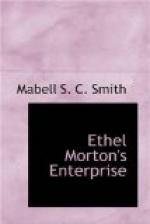“You needn’t feel at all apologetic,” broke in Stanley. “It’s never safe to buy property without having a clear title, and we aren’t sure that we are in a position to give you a clear title.”
“That’s why we haven’t spoken to you about it before,” said the elder Miss Clark; “we were waiting to try to make it all straight before we said anything about it one way or the other.”
“Not give me a clear title!” cried Mrs. Smith. “Do you mean that I won’t be able to buy it? Why, I don’t know what Dorothy will do if we can’t get that bit with the brook; she has set her heart on it.”
“We want you to have it not only for Dorothy’s sake but for our own. It isn’t a good building lot—it’s too damp—and we’re lucky to have an offer for it.”
“Can you tell me just what the trouble is? It seems as if it ought to be straight since all of you heirs agree to the sale.”
“The difficulty is,” said Stanley, “that we aren’t sure that we are all the heirs. We thought we were, but Uncle William made some inquiries on his way here, and he learned enough to disquiet him.”
“Our father, John Clark, had a sister Judith,” explained the younger Miss Clark. “They lived here on the Clark estate which had belonged to the family for many generations. Then Judith married a man named Leonard—Peter Leonard—and went to Nebraska at a time when Nebraska was harder to reach than California is now. That was long before the Civil War and during those frontier days Aunt Judith and Uncle Peter evidently were tossed about to the limit of their endurance. Her letters came less and less often and they always told of some new grief—the death of a child or the loss of some piece of property. Finally the letters ceased altogether. I don’t understand why her family didn’t hold her more closely, but they lost sight of her entirely.”
“Probably it was more her fault than theirs,” replied Mrs. Smith softly, recalling that there had been a time when her own pride had forbade her letting her people know that she was in dire distress.
“It doesn’t make much difference to-day whose fault it was,” declared Stanley Clark cheerfully; “the part of the story that interests us is that the family thought that all Great-aunt Judith’s children were dead. Here is where Uncle William got his surprise. When he was coming on from Arkansas he stopped over for a day at the town where Aunt Judith had posted her last letter to Grandfather, about sixty years ago. There he learned from the records that she was dead and all her children were dead—except one.”
“Except one!” repeated Mrs. Smith. “Born after she ceased writing home?”
“Exactly. Now this daughter—Emily was her name—left the town after her parents died and there is no way of finding out where she went. One or two of the old people remember that the Leonard girl left, but nothing more.”
“She may be living now.”




